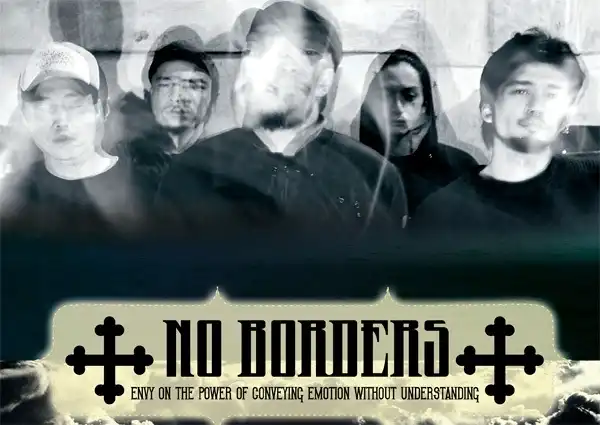
Envy: No Borders
Music Interviews
Japanese post-hardcore giants Envy create brutally dense soundscapes that skirt the edge between hardcore and post-rock, and cut across language barriers. Envy started as a formidable hardcore band borrowing equally from legendary Japanese bands such as G.I.S.M., SS and NYC legends Born Against.
Their fifth album, Recitation, is due out Oct. 12 on Temporary Residence (a day before their Ogden appearance), and solidifies their full musical evolution into a peerless band incorporating the speed, intensity and direct emotional contact of hardcore and the expansive structure of post-rock. While boasting a strong following in Japan, their splits and collaborations with similar genre-defying heavy bands such as Jesu, Mogwai and Thursday have spread their reputation far beyond Japan’s shores.
Prior to their October 13 show in Ogden’s The Basement, I spoke to lead singer Tetsuya Fukagawa via a translated e-mail about the ability to express hope in heavy music and the conveying of complex emotions without language being a factor.
SLUG: With a large part of your fanbase living outside of Japan, and thus not speaking Japanese, what do you try to communicate through your music without using the direct means of communication? What emotions are you trying to convey?
Tetsuya: Language isn’t a deadlock for us. No matter what language I sing in, I believe there is emotion. I was brought up speaking Japanese, so I think it is strange for me to sing in English. I will be happy if the listener reflects emotion to Envy’s songs and it amplifies their anger or they feel gentle. Envy expresses emotions such as sadness and joy through the lyrics and the sounds as well.
SLUG: How important is it for the listening audience to understand your lyrics?
Tetsuya: All of our songs are written in Japanese and have been translated [in each album’s liner notes] by my friend, so the nuances are a little different from this point. We try to talk our way through [the translations] to get near to the point, but there are some difficult words to translate. I choose poetic words indirectly from the world and I try to create rather than express words directly for my lyrics. It is important for me, but I don’t want to push the meanings of the lyrics on the listeners, I just want them to understand in their own way by reading the translated lyrics.
SLUG: Your sound is informed by equal parts hardcore and post-rock. Was this a conscious choice to mix the two, or part of your gradual evolution away from the more traditional hardcore song structure of earlier releases?
Tetsuya: A lot of the loud and fast songs were made from impulse in the early days. Our sounds grew up together and transformed into songs that wrap the atmosphere. We pay attention creating the sound, too. It would be boring if everything sounded the same. I try hard to create aggressive, beautiful and dignified songs.
SLUG: Although your music is heavy, it seems to communicate hope. Is this a fair assessment? If so, what prompted you to do this?
Tetsuya: I want to express feelings such as joy, anger, sadness and delight into the songs. Songs that are just dark could be okay, but if we couldn’t see hope, we can’t go far and lose ourselves. It also reflects how we feel while we are creating songs. When we’re in a good mood, songs like “Dreams Coming to an End” become a slightly cheerful melody.
SLUG: With your fifth release coming out on October 12 what can we expect? Is it going to be a move away from the more atmospheric textures of Insomniac Doze?
Tetsuya: We haven’t thought about comparing much to our previous album, but listeners may feel different either way. We did take a long time, and have experienced a lot, so we should be matured. We should have become better in performance. I think we are spreading out as an ensemble.
Envy will be playing October 13 at The Basement in Ogden with Trash Talk, Touché Amore and Irish math-rock group And So I Watch You From Afar.
